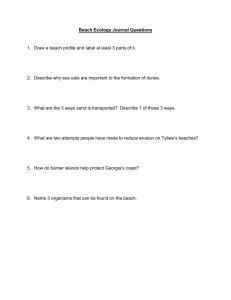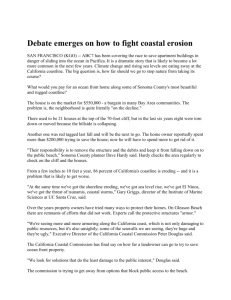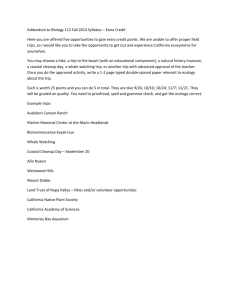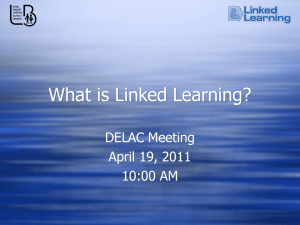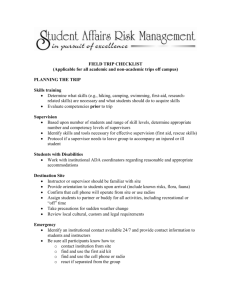Oceanography Lab Syllabus Spring 2016 Mira Costa College
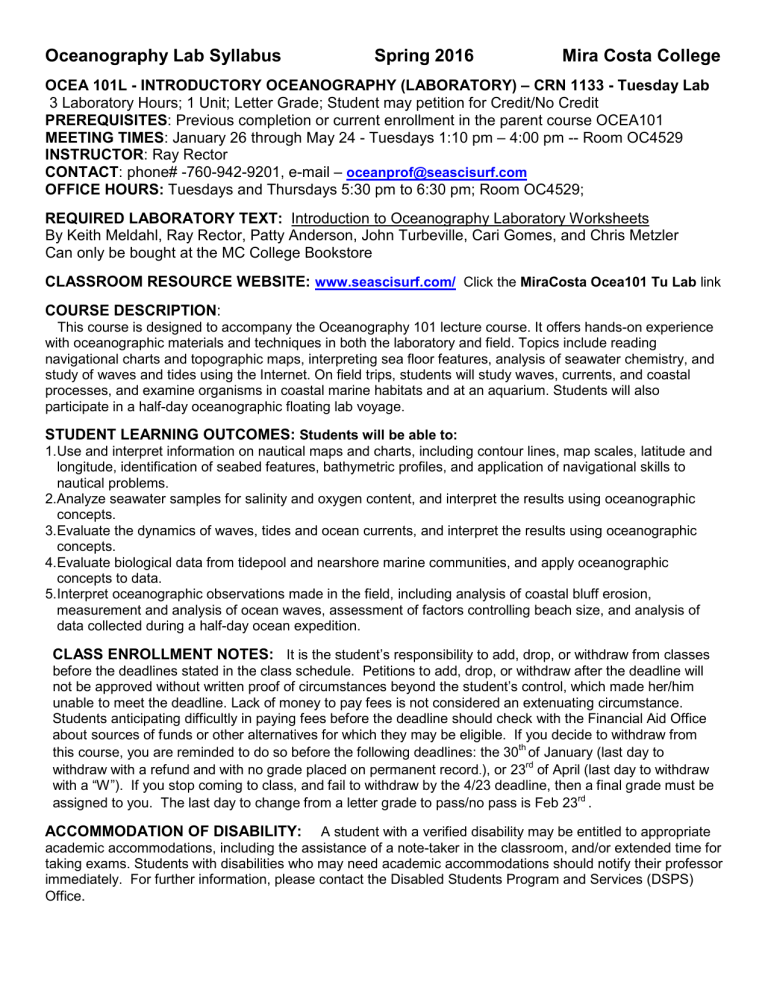
Oceanography Lab Syllabus Spring 2016 Mira Costa College
OCEA 101L - INTRODUCTORY OCEANOGRAPHY (LABORATORY) – CRN 1133 - Tuesday Lab
3 Laboratory Hours; 1 Unit; Letter Grade; Student may petition for Credit/No Credit
PREREQUISITES : Previous completion or current enrollment in the parent course OCEA101
MEETING TIMES : January 26 through May 24 - Tuesdays 1:10 pm – 4:00 pm -- Room OC4529
INSTRUCTOR : Ray Rector
CONTACT : phone# -760-942-9201, e-mail –
oceanprof@seascisurf.com
OFFICE HOURS: Tuesdays and Thursdays 5:30 pm to 6:30 pm; Room OC4529;
REQUIRED LABORATORY TEXT: Introduction to Oceanography Laboratory Worksheets
By Keith Meldahl, Ray Rector, Patty Anderson, John Turbeville, Cari Gomes, and Chris Metzler
Can only be bought at the MC College Bookstore
CLASSROOM RESOURCE WEBSITE:
www.seascisurf.com/ Click the MiraCosta Ocea101 Tu Lab link
COURSE DESCRIPTION :
This course is designed to accompany the Oceanography 101 lecture course. It offers hands-on experience with oceanographic materials and techniques in both the laboratory and field. Topics include reading navigational charts and topographic maps, interpreting sea floor features, analysis of seawater chemistry, and study of waves and tides using the Internet. On field trips, students will study waves, currents, and coastal processes, and examine organisms in coastal marine habitats and at an aquarium. Students will also participate in a half-day oceanographic floating lab voyage.
STUDENT LEARNING OUTCOMES:
Students will be able to:
1. Use and interpret information on nautical maps and charts, including contour lines, map scales, latitude and longitude, identification of seabed features, bathymetric profiles, and application of navigational skills to nautical problems.
2. Analyze seawater samples for salinity and oxygen content, and interpret the results using oceanographic concepts.
3. Evaluate the dynamics of waves, tides and ocean currents, and interpret the results using oceanographic concepts.
4. Evaluate biological data from tidepool and nearshore marine communities, and apply oceanographic concepts to data.
5. Interpret oceanographic observations made in the field, including analysis of coastal bluff erosion, measurement and analysis of ocean waves, assessment of factors controlling beach size, and analysis of data collected during a half-day ocean expedition.
CLASS ENROLLMENT NOTES:
It is the student’s responsibility to add, drop, or withdraw from classes before the deadlines stated in the class schedule. Petitions to add, drop, or withdraw after the deadline will not be approved without written proof of circumstances beyond the student’s control, which made her/him unable to meet the deadline. Lack of money to pay fees is not considered an extenuating circumstance.
Students anticipating difficultly in paying fees before the deadline should check with the Financial Aid Office about sources of funds or other alternatives for which they may be eligible. If you decide to withdraw from this course, you are reminded to do so before the following deadlines: the 30 th of January (last day to withdraw with a refund and with no grade placed on permanent record
.
), or 23 rd of April (last day to withdraw with a “W”). If you stop coming to class, and fail to withdraw by the 4/23 deadline, then a final grade must be assigned to you. The last day to change from a letter grade to pass/no pass is Feb 23 rd
.
ACCOMMODATION OF DISABILITY:
A student with a verified disability may be entitled to appropriate academic accommodations, including the assistance of a note-taker in the classroom, and/or extended time for taking exams. Students with disabilities who may need academic accommodations should notify their professor immediately. For further information, please contact the Disabled Students Program and Services (DSPS)
Office
.
INSTRUCTOR’S ATTENDANCE POLICY:
Attendance is critical to successfully completing this course.
Attendance is taken every class meeting by means of a sign-up sheet that will be passed around at the beginning of each class. You are required to attend the entire scheduled lab meeting, unless I excuse you early. It is your responsibility to 1) show up on time, 2) sign in, and 3) attend the entire scheduled lab meeting, in order to receive credit for that class meeting. It will be up to you for staying up with lab assignments and exams. Make sure and consult the schedule, lab manual, class notes, classroom website, and fellow classmates about the material that was missed during absences. There is no make-up or rescheduling of either labs or lab exams. I realize that situations can arise that are beyond your control, which could interfere with attending this class. You are allowed to miss or drop one lab exercise during the semester without penalty. One exception is the Human Impacts on Coastal Ecosystems (HICE) Activity , which is worth twice the value of any other lab exercise - it cannot be dropped (note that if you miss the HICE activity, it will count as if you missed two regular labs).
TARDINESS and TURNING IN COMPLETED LAB WORK:
Being late to a class once or twice is understandable; however, it should not become a habit. Constant tardiness will not be tolerated. Students will be given a warning and if he or she continues to be tardy, then each additional tardy (past the initial first two) will be counted as half an absence. If you do arrive to class late, then please use the interior entry door to enter the classroom. Very Important Note: Pre-lab assignment work must be completely ready for instructor signoff at the very beginning of the scheduled lab time. Late pre-lab work will not be accepted for grade points.
Completed in-lab worksheets must be turned in at the end of the lab on that same lab day, prior to leaving the classroom, except if told otherwise by the instructor. Late lab work will not be accepted - no exceptions.
CLASSROOM AND FIELDTRIP BEHAVIOR AND STUDENT CODE OF CONDUCT:
Students are expected to respect and obey standards of student conduct while in class and on campus. Charges of misconduct and disciplinary sanctions may be imposed upon students who violate these standards of conduct or provisions of college regulations. As your instructor, I have the following expectations of your behavior in my class:
1) Promote a positive learning environment by exhibiting mutual respect and consideration of the feelings, ideas, and contributions of others.
2) Demonstrate a genuine desire to learn, interact, and improve academically.
3) Demonstrate respect for furniture, tools, equipment, and supplies in the classroom.
4) Clean up after yourself.
5) No eating or drinking in the laboratory classroom – water is OK.
6) All cell phones, pagers, and audio players must remain turned off, or in silent mode.
7)
This class will be conducted in accordance with the college code of student conduct and basic standards of academic honesty. Cheating, plagiarism, or other forms of academic dishonesty are totally unacceptable and will not be tolerated. Violations of standards of academic honesty will be reported to the school dean for appropriate action. See the full version of the instructor’s plagiarism policy at the www.seascisurf.com/ site under the
MiraCosta OCEA 101L Tu Lab
link.
GRADING/EVALUATION
I. LABS: Fifteen (15) laboratory write-ups @ 30 points each (except for HICE = 60 points)
Note: The mandatory EL Nino Field Research Project counts as one regular lab (lab #15).
II. EXAMS: Mid-term exam - 140 points; Final exam - 140 points
III. Late pre-lab assignments are not accepted.
III. Late lab assignments or make-ups are not accepted.
IV. Lowest of the 15 lab score will be dropped; Exceptions: The HICE lab and the El Nino
project scores cannot be dropped.
V. Total possible points = 730
VI. Extra credit is offered (up to 30 points). Limited to instructor's weekend beach fieldtrips
VII. Grading Scale: 100% – 90% = A
89% -- 80% = B
79% -- 70% = C
69% -- 55% = D
< 55% = F
LAB MATERIALS:
The following are required lab supplies (by second class meeting) that you will need for all labs during the semester: oceanography lab manual (at bookstore), 3-ring binder notebook, stapler, #2 pencils with erasers, calculator, and a clipboard (recommended) for field trips. Please, use a pencil for filling out lab worksheets!
NECESSARY LAB EXPENDITURES:
1) There is no required textbook for this lab. However, you must purchase the set of course laboratory worksheets (available at the bookstore) by the second lab meeting.
2) The main expense will be a $35 fee, to be paid by April 12th , which will cover the cost of the Human
Impacts on Coastal Ecosystems Lab (HICE) at Dana Point Harbor.
3) There is an $8 admission fee for the Birch Aquarium lab.
LAB PROCEDURES:
I. BEFORE THE LAB:
You must be prepared and appropriately dressed for the labs.
1) Read (several times) the lab exercise in the lab manual.
2) You are responsible for completing any Pre-lab exercises (if applicable) before you come to class.
Pre-labs are checked (singed off by me) at the beginning of the lab meeting. Late pre-labs are not accepted.
PLEASE NOTE:
You must access the Internet to download/print-out the prelab worksheet (pdf)
and information needed to complete the prelab worksheet. The necessary website link is:
http://www.miracosta.edu/home/kmeldahl/prelabs/
3) Be appropriately dressed for the lab you are about to complete.
4) You will not be allowed to participate in the Tidepools, Chemistry, or the Dana Point HICE Trip without closed-toed shoes. I strongly encourage you to wear closed-toed shoes to the rest of the labs as well.
5) You are responsible for knowing the date, time, and location for all fieldtrip meetings: Check the lab schedule prior to each lab. - Know the directions on how to get there way ahead of time.
II. DURING THE LAB :
A brief lab lecture by the instructor to explain some the activities that you will
complete in lab.
1) Be prepared by reading the lab and becoming familiar with it before we start.
2) Do not disrupt other lab groups by excessive off-topic talking, socializing, etc.
3) You must work with lab partners in groups of 3 or 4 (not any larger groups, please).
4) You must have your own lab notebook, no sharing.
5) You may not split labs among lab partners and recombine the parts later. In other words, you must complete the entire lab individually as a group.
6) Please turn off your cell phone unless you are expecting an emergency.
III. AT THE END OF THE LAB:
When your group has completed the lab exercise, turn in your completed, properly COLLATED and STAPLED lab WITH your written reflection . Points will be deducted for being disruptive, coming to lab late, not being prepared, or incomplete and/or unsatisfactory work.
Important Note : Use a three 3-ring binder notebook to compile and save all your laboratory coursework throughout the semester. You will be allowed to access your compiled lab work during exams.
MANDATORY FIELD TRIP PROCEDURES AND FEES:
For the mandatory field trips, we will meet in the field at a designated time instead of meeting in class. Consult the syllabus and lab manual for locations and meeting times. School policy prohibits firearms, illegal drugs, alcohol, or intoxication on any field trip or in class.
Only two of the mandatory fieldtrips require students to pay special fees: the Birch Aquarium and the HICE.
Special departure dates and times for the Human Impacts on Coastal Ecosystems (HICE) Activity:
Students have the choice of signing up for one of two dates, depending on what works best for their schedule. The two tentative planned dates are as follows: May 8 th
(Friday) and May 9 th
(Saturday). Both dates have a 12 pm to 4 pm start/finish time window. The last day to sign up for one of the HICE meetings is Tuesday April 12th . Once you have chosen and signed up for a specific date, you must stick with that date – no last minute changes are allowed. The instructor will pass around a sign-up sheet early on in the
semester. You must be at the Dana Point Ocean Institute for the HICE activity by 12:00 pm sharp. The activity will finish by 4:00 pm.
Field Trip Cancellation Policy
If the weather looks REALLY threatening (like pouring rain) on a day that a lab fieldtrip is scheduled, then I will make a determination at least 2 hours before the lab time to cancel the trip. I will, at that time, email everyone to notify students of the cancellation, and post a cancellation message on the classroom web page.
Costs for the Birch Aquarium and HICE field trips:
The Birch Aquarium now has system in which students doing required assignments educational discount by buying tickets ahead of time using a credit card on Go to: http://aquarium.ucsd.edu/Plan_a_Visit/
Click on ―Buy Tickets Onlineǁ Scroll down to ―College Students on Assignmentǁ
You don‘t have to buy your ticket ahead of time through the aquarium website, admission will cost several dollars more at the museum entrance. For aquarium hours and more info go to: http://aquarium.ucsd.edu/
The cost for the Human Impacts on Coastal Ecosystems (HICE) Activity is $35.00. You must pay the $35 for the HICE at the MiraCosta cashier’s office by Tuesday April 12th . You also must present your HICE cashier’s receipt to the instructor at this time. Use your own transportation to get there. Carpooling is highly recommended.
MANDATORY El NI Ň O FIELD PROJECT:
One requirement of lab this semester is for you to personally document the coastal erosion effects of the current El Niňo at the coast. Our coastline has already experienced several El Niňo-related storms, and more storms will likely strike over the coming months. The economic impacts of El Niňo erosion on our coastline are likely to be substantial.
You will complete this project independently, outside of lab time. The project counts as one full lab exercise
(Lab #15). In order to balance fairly the time required to do the project, you will get an “off week” near the end of the semester with no lab (Exam Review Lab).
Your job is pick a location along the coast that you will visit four times this semester, at low tides in
February, March, April, and May. (I’ll give you a range of dates and times to choose from each month.)
Appropriate locations include lagoon mouths, coastal bridges, coastal roadways, seawalls, coastal bluffs, and sections of beach that have distinctive landmarks (such as houses, access steps, etc). Each time you visit your location, you will take photographs from exactly the same position and angle. Your job is to document any changes that may occur over the next several months, such as erosion of coastal bluffs, roadways, bridges, lagoon channels, beach access steps, and so forth, as well as changes in sand levels on the beach, and/or shifts in the composition of beach sediment. At the end of the semester, you will write a short report about the changes demonstrated in your photographs, and submit the report, along with printed copies of your photographs by the last regular lab meeting (Lab 15). More details about this project will be forthcoming.
VOLUNTARY WEEKEND FIELD TRIPS:
Three voluntary, extracurricular, weekend field trips are tentatively planned this semester: Note: These field trips are totally voluntary and will earn you extra credit points!
1) Weekend field trip: Saturday February 20 – Torrey Pines Beach, 10:00 am
2) Weekend field trip: Sunday March 13 – Blacks Beach, 10:00 am
3) Weekend field trip: Saturday April 2 – Moonlight Beach, 10:00 am
Note: Check the professor’s classroom web page for fieldtrip details
• Extra credit and/or excessive absence make-up will be awarded for participating on these trips.
• The experience gained on fieldtrips greatly helps in understanding the ocean curriculum.
• Field trips are really fun and a great way to better know your classmates and instructor.
• Each fieldtrip is worth up to 10 points. Earn up to 30 extra points for extra credit work.
CLASSROOM WEBSITE RESOURCE:
The instructor has set up a personal website as an academic resource for his oceanography students. This site is located at http://www.seascisurf.com/ .
Clicking on MiraCosta OCEA 101L Tu Lab link will give you direct access to a wide variety of classroom information and ocean resources.
Tuesday Ocean Laboratory Schedule - MiraCosta Spring 2016
Date Lab Meeting Lecture and Discussion Topic
Location and Time
Tu 1/26 LAB 1 - Introduction / Safety / Scientific Method
Tu 2/2 LAB 2 - Isostasy
Tu3/9 LAB 3 - Maps and Charts
Tu 2/16 LAB 4 - Seafloor Geography / Plate Tectonics
Sat 2/20 Voluntary Weekend Fieldtrip - Torrey Pines Beach -
Coastal Geology and Tectonics Theme
Tu 2/23 LAB 5 – Navigation
Tu 3/1 LAB 6 - Sediments
Tu 3/8 LAB 7 - Seawater Chemistry
Ocean Chemistry (closed-toed shoes required)
Sun 3/13 Voluntary Weekend Fieldtrip - Blacks Beach
Waves and Currents Theme
Tu 3/15 MIDTERM LAB EXAM
Tu 3/22 SPRING BREAK
Tu 3/29 LAB 8 - Ocean Waves - Field Trip
Sat 4/2
10 am
Voluntary Weekend Fieldtrip
Coastal Erosion Theme
– Moonlight Beach
Tu 4/5 LAB 9 – Beach Sediments and Tidepools – Field Trip
Tu 4/12 LAB 10 – Coastal Swell and Gyres
Note: $35 fee for HICE lab due at campus cashier
OC4529 @ 1:10 pm
OC4529 @ 1:10 pm
OC4529 @ 1:10 pm
OC4529 @ 1:10 pm
Torrey Pines Beach @ 10 am
See Online Fieldtrip guide for info
OC4529 @ 1:10 pm
OC4529 @ 1:10 pm
OC4529 @ 1:10 pm
Blacks Beach @ 10 am
See Online Fieldtrip guide for info
OC4529 @ 1:10 pm
NO LAB
Oceanside Pier @ 1:30 pm
Moonlight Beach @ 10 am -
See Online Fieldtrip guide for info
Swamis Beach Park @ 1:30 pm
OC4529 @ 1:10 pm
Tu 4/19 LAB 11 - Beach Profiling - Field Trip Tamarack Beach @ 1:30 pm
Tu 4/26 LAB 12 - Birch Aquarium – Field Trip Birch Aquarium @ 1:30 pm
Tu 5/3 LAB 13 - Beach and Bluff Erosion - Field Trip Stonesteps Beach @ 1:30 pm
Tu 5/10 LAB 14 – Human Impacts on Coastal Ecosystems Lab (HICE) -
Field Trip Closed-toe shoes required. Note special meeting time;
Choose either date: Friday May 13 th
or Friday May 20 th
Ocean Institute at Dana Point @
11:10 pm to 4:00 pm Show up on time on chosen Date and Time. Note that we will not meet in lab this week.
Tu 5/17 LAB 15 - Final Exam Preparatory/Review Lab
El Nino Field Research Due
/ Research Discussion/Analysis
OC4529 @ 1:10 pm
Tu 5/24
FINAL LAB EXAM
OC4529 @ 1:00 pm
Please Note : This schedule may be changed or modified by the instructor at anytime during the semester.
Students will be notified in a timely basis if changes are made.

